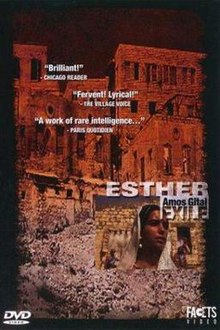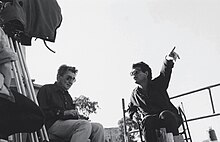Esther (1986 film)
This article may contain an excessive number of citations. (October 2018) |
| Esther | |
|---|---|
 DVD cover art | |
| Directed by | Amos Gitai |
| Written by |
|
| Starring |
|
| Cinematography | |
Production companies | |
| Distributed by | Facets Multi-Media |
Release date |
|
Running time | 97 minutes |
| Countries |
|
| Language | Hebrew |
Esther (Hebrew: אסתר) is a 97-minute 1986 Austrian-British-Dutch-Israeli Hebrew-language independent underground dramatic historical experimental art film directed by Amos Gitai, his directorial debut. The film tells the story of Esther from the Hebrew Bible's Book of Esther and stars Simone Benyamini, Zare Vartanian, Mohammad Bakri and Juliano Mer-Khamis.
Synopsis
[edit]When King Ahasuerus (Zare Vartanian) of Persia drives out of his court Queen Vashti for refusing to show up before him, a frantic search for young virgins is unleashed throughout the kingdom, extending from India to Ethiopia. Esther, an orphan who was raised by her Jewish uncle, Mordecai (Mohammad Bakri), has entered the King's harem, having been chosen as his wife without the knowledge that she was Jewish. At court, she has thwarted an attack against the King thanks to information provided by her uncle. For the service rendered, Esther and Mordecai have become the only free court characters not to prostrate themselves in front of anyone. However, when Mordecai refuses to bow to Minister Haman (Juliano Mer-Khamis), the latter commands the death of all of the Jews of the kingdom under the seal of the King. This is discovered by Esther and Mordecai, who devise a plan to save their people. Mordecai acts in advance against Haman, ordering the vengeful extermination of all of those who want the death of the Jews.[1][2][3]
Cast
[edit]- Simone Benyamini as Esther
- Zare Vartanian as Ahasuerus
- Mohammad Bakri as Mordecai
- Juliano Mer-Khamis as Haman
- Shmuel Wolf
- Rim Banna
- Fouad Awad
- Tarik Kopty
- George Khleifi

Production
[edit]The film marked the directorial debut of Amos Gitai,[4] who also wrote the screenplay.[5] It was shot by Henri Alekan and Nurith Aviv (with Ilan Yagoda assisting), and cast by Levia Hon.
Developed at Herzliya Studios and financed by Interkerkelijke Omroep Nederland and Film4 Productions, the film was distributed by Facets Multi-Media.
Release
[edit]The film was screened at the May 1986 Cannes Film Festival during the International Critics's Week, at the October 1986 Torino Film Festival where it also won several awards, and at the 36th Berlin International Film Festival on 21 February 1992. The film was released in Israel, where it premiered at the Tel Aviv Museum of Art, together with Berlin-Jerusalem (1989) as part of a DVD boxset in 2005.[6]
Critical response
[edit]Stephen Holden of The New York Times opined that "[t]hough not especially entertaining, it is quite handsome and bristling with ideas."[4] In Israel, however, some reviewers were more negative. Daniel Warth of Ha'ir, while noticing similarities to the works of Pier Paolo Pasolini, Bertolt Brecht, and Miklós Jancsó, stated that the film "is an artistic pretension which remains nothing but an aesthical drill with unsophisticated political declarations."[7]
References
[edit]- Citations in article
- ^ Sources:
- Kronish, Amy W. (1996). World Cinema: Israel. World Cinema, Volume 6, Series Editor: Frank Bren. Trowbridge and Cranbury, New Jersey: Flicks Books and Rosemont Publishing & Printing Corp.’s Associated University Presses. p. 210. ISBN 9780948911705. OCLC 568122092. Retrieved 30 September 2018.
- Gross, Natan. הסרט העברי – פרקים בתולדות הראינוע והקולנוע בישראל: 1896–1991 [The Hebrew Film – Chapters in the Annals of Silent and Sound Cinema in Israel: 1896–1991] (in Hebrew). Jerusalem: Natan and Yaacov Gross. 1991. p. 441. OCLC 27221790. Retrieved 30 September 2018.
- Schnitzer, Meir. הקולנוע הישראלי: כל העובדות, כל העלילות, כל הבמאים וגם ביקורות [Israeli Cinema: All Facts, All Plots, All Directors, and All Critiques] (in Hebrew). Or Yehuda and Jerusalem: Kinneret Zmora-Bitan Dvir, Jerusalem Cinematheque’s Israel Film Archive, and Ministry of Education’s Israel Film Institute. 1994. p. 278. ISBN 9789652863782. OCLC 31817606. Retrieved 30 September 2018.
- ^ Sources:
- Schenkar, Guilhad Emilio (12 August 2014). חי בסרט – עמוס גיתאי [Living in Films – Amos Gitai] (in Hebrew). Jerusalem: Ministry of Education’s Israeli Educational Television. Retrieved 30 September 2018.
- Ginsberg, Prof. Dr. Terri; Lippard, Prof. Dr. Chris (March 2010). Historical Dictionary of Middle Eastern Cinema. Historical Dictionaries of Literature and the Arts, Volume 36, Series Editor: Arthur Jon Woronoff. Lanham, Maryland, Toronto, Ontario, and Plymouth: Rowman & Littlefield’s The Scarecrow Press, Inc. p. 137. ISBN 9780810873643. OCLC 718533076. Retrieved 30 September 2018.
- Schweitzer, Dr. Ariel. אסתר, או הפורים־שפיל של עמוס גיתאי [Esther, or the Pourim-Shpil of Amos Gitai]. Zmanim: A Historical Quarterly, Volume 75 (in Hebrew). Tel Aviv-Yafo, Jerusalem, and Ra’anana: The Zvi Yavetz School of Historical Studies, The Lester and Sally Entin Faculty of Humanities, Tel Aviv University, The Historical Society of Israel’s Zalman Shazar Center, and The Department of History, Philosophy, and Judaic Studies, Open University of Israel. Summer 2001. pp. 76–82. JSTOR 23437280.
- ^ Sources:
- Ehrich, Carl S. [in German] (September 2016). "Esther in film". In Burnette-Bletsch, Rhonda (ed.). The Bible in Motion: A Handbook of the Bible and Its Reception in Film. Handbooks of the Bible and Its Reception (HBR). Vol. 2. Berlin and Boston, Massachusetts: Walter de Gruyter. pp. 122–124. ISBN 9781614513261. OCLC 959149599. Retrieved 30 September 2018 – via Google Books.
- Fainaru, Edna; Fainaru, Dan (9 April 1986). אסתר – משוש האינטלקטואלים [Esther – The Opium of the Intellectuals] (PDF). HaOlam HaZeh (in Hebrew). Tel Aviv-Yafo: HaOlam HaZeh. Archived from the original (PDF) on 4 July 2021. Retrieved 30 September 2018.
- Pélisson, Olivier. 1986: Amos Gitaï – Esther Is Born (in French). Paris: Hildegarde Society’s Le Film français, 15 avril 2013. Retrieved 1 October 2018.
- Schwartz, Dennis (26 July 2018). "Ably Tells the Purim Story of the Jews". Ozu’s World Movie Reviews. Bennington, Vermont: Online Film Critics Society. Archived from the original on 2 October 2018. Retrieved 1 October 2018.
- ^ a b Holden, Stephen (19 May 1989). "Reviews/Film; The Purim Story, With Modern Overtones". The New York Times. p. 16. Retrieved 11 October 2018.
- ^ Clanton Jr., Dan W. (2009). Daring, Disreputable and Devout: Interpreting the Hebrew Bible's Women in Art and Music. Continuum International Publishing Group. p. 122. ISBN 978-0-5670-2747-4. Retrieved 10 October 2018 – via Google Books.
- ^ Gitai, Prof. Dr. Amos (2005). ברלין ירושלים [Berlin-Jerusalem] (DVD) (in Hebrew). Ramat HaSharon: NMC Music’s Globus United King Films. OCLC 920667873. Retrieved 30 September 2018.
- ^ Warth, Daniel (9 July 1986). תרגיל אסתטי [An Aesthetical Drill] (PDF). Ha'ir (in Hebrew). Tel Aviv-Yafo: Haaretz Group's Schocken Group. Archived from the original (PDF) on 4 July 2021. Retrieved 30 September 2018 – via idea.cimema.co.il.
- Sources used
- Wacker, Prof. Dr. Marie-Theres. Das biblische Estherbuch zwischen Palästina und Israel. Zum Film Esther von Amos Gitai (1986) und seiner Kontextualisierung [The Biblical Book of Esther Between Palestine and Israel: On the Film Esther By Amos Gitai (1986) and Its Contextualization]. In: Zwick, Prof. Dr. Reinhold, Hrsg. (2013). Religion und Gewalt im Bibelfilm [Religion and Violence in Bible Films]. Film & Theologie [Film & Theology], Band 20 (in German). Marburg: Schüren Verlag, Juli 2012, S. 39–59. ISBN 9783894727604. OCLC 818726511. Retrieved 1 October 2018.
{{cite book}}: CS1 maint: multiple names: authors list (link) - Meroz, Tamar (27 March 1986). "Purim Now" (PDF). Haaretz, reprinted in: Esther: An Amos Gitai Film, Paris: Agav Films, 1986. Tel Aviv-Yafo: M. DuMont Schauberg and Haaretz Group. pp. 19–21. OCLC 745373991. Archived from the original (PDF) on 4 July 2021. Retrieved 1 October 2018. Reprinted as “Esther” in: Willemen, Paul, ed. (Autumn 1993). The Films of Amos Gitai: A Montage. BFI Film Classics. London: British Film Institute. pp. 61ff. ISBN 9780851704166. OCLC 882549941. Retrieved 4 October 2018.
- Neeman, Rachel (2 April 1986). תנ״ך עכשיו [The Bible Now] (PDF). Koteret Rashit (in Hebrew). Tel Aviv-Yafo and Rishon LeZion: Histadrut’s Society of Workers’s Davar, Klal, and Yedioth Ahronoth Group’s Yedioth Ahronoth. Archived from the original (PDF) on 4 July 2021. Retrieved 1 October 2018. English translation: Neeman, Rachel (2 April 1986). "The Bible Now" (PDF). Esther: An Amos Gitai Film. Paris: Agav Films, 1986. pp. 22–23. OCLC 745373991. Archived from the original (PDF) on 4 July 2021. Retrieved 1 October 2018. Reprinted as “Esther” in: Willemen, Paul, ed. (Autumn 1993). The Films of Amos Gitai: A Montage. BFI Film Classics. London: British Film Institute. pp. 56–61. ISBN 9780851704166. OCLC 882549941. Retrieved 4 October 2018.
- Zwick, Prof. Dr. Reinhold. "Mit Esther für Versöhnung Streiten: Zu Amos Gitais filmischer Aktualisierung der biblischen Erzählung" [Solving Conflicts With Esther: On Amos Gitai’s Cinematic Modernization of the Biblical Tale]. Biblical Interpretation: A Journal of Contemporary Approaches, Band 14: Jahrgänge 1–2, Januar 2006, S. 54–75 (in German). Leiden: Brill Publishers. Retrieved 30 September 2018. Nachgedruckt in: Exum, Prof. Dr. Jo Cheryl, Hrsg. (March 2006). The Bible in Film — The Bible and Film: Reprinted From Biblical Interpretation Volume 14, 1–2 (in German). Leiden: Brill Publishers, S. 54–75. ISBN 9789004151901. OCLC 611759359. Retrieved 30 September 2018.
{{cite book}}: CS1 maint: multiple names: authors list (link)
Further reading
[edit]- Willemen, Paul (1993). The Films of Amos Gitai: A Montage. BFI Film Classics. London: British Film Institute. pp. 56–62. ISBN 9780851704166. OCLC 882549941. Retrieved 4 October 2018.
- Privett, Ray (11 June 2009). Série Exil partie 1, Esther et Berlin Jérusalem [Exile Series Part 1, Esther and Berlin-Jerusalem] (in French). Condé-sur-Noireau: Éditions Charles Corlet. pp. 52–57. ISBN 9782847062915. Retrieved 1 October 2018.
{{cite book}}:|work=ignored (help) - Pras, Sylvie, éd. (August 2003). Amos Gitai (in French). Paris: Centre Georges Pompidou. pp. 116ff. ISBN 9782844262264. OCLC 54542427. Retrieved 1 October 2018.
{{cite book}}: CS1 maint: multiple names: authors list (link) - Toubiana, Serge. Piégay, Baptiste (2003). Exils et territoires: Le cinéma d'Amos Gitaï [Exiles and Territories: The Cinema of Amos Gitai]. Collection Auteurs [Auteurs Collection] (in French). London, New York, New York, Strasbourg, et Paris: Phaidon Press’s Cahiers du cinéma et Arte éd., juillet 2003. pp. 144ff. ISBN 9782866422257. OCLC 237852120. Retrieved 1 October 2018.[permanent dead link]
- Variety's Film Reviews, Volume 19: 1985–1986. New York, New York: Cambridge Information Group’s R.R. Bowker and RELX Group’s Reed Publishing. February 1990. ISBN 9780835227995. OCLC 655330431. Retrieved 1 October 2018.
- Rooke, Deborah W. (June 2018). "Chapter 26: "What Shall We Do With the Tainted Maiden?": Film Treatments of the Book of Esther". In Walsh, Richard G (ed.). T&T Clark Companion to the Bible and Film. Bloomsbury Companions. London and Edinburgh: Bloomsbury Publishing’s T&T Clark. pp. 330–332. ISBN 9780567666215. OCLC 985072500. Retrieved 30 September 2018 – via Google Books.
External links
[edit]- Esther at Amos Gitai’s Official Website Archived 22 September 2019 at the Wayback Machine
- Esther at IMDb
- Esther at Rotten Tomatoes
- 1986 films
- 1980s avant-garde and experimental films
- 1980s historical drama films
- 1986 independent films
- 1980s political drama films
- Austrian historical drama films
- Austrian independent films
- British avant-garde and experimental films
- British historical drama films
- British independent films
- British political drama films
- 1986 directorial debut films
- Dutch avant-garde and experimental films
- Dutch historical drama films
- Dutch independent films
- Films about antisemitism
- Films about families
- Films about orphans
- Films about politicians
- Films about prejudice
- Films about remarriage
- British films about revenge
- Australian films about revenge
- Films about royalty
- Films about Jews and Judaism
- Films based on the Book of Esther
- Films directed by Amos Gitai
- Films set in ancient Persia
- Films set in the 5th century BC
- Films shot in Israel
- Genocide in fiction
- 1980s Hebrew-language films
- Israeli avant-garde and experimental films
- Israeli historical drama films
- Israeli independent films
- 1980s British films
- Films shot in 16 mm film
